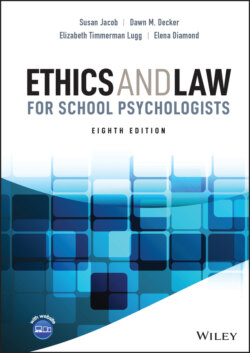Читать книгу Ethics and Law for School Psychologists - Susan Jacob - Страница 92
LEGAL TRAINING FOR SCHOOL PSYCHOLOGISTS
ОглавлениеLeaders in the field of school psychology called for increased training in the legal aspects of practice in the mid-1970s, the years coinciding with the passage of federal special education legislation, Section 504 of The Rehabilitation Act of 1973, and FERPA (Kaplan et al., 1974). As noted previously, the NASP publication School Psychology: A Blueprint for Training and Practice (Ysseldyke et al., 2006) identified legal, ethical, and social responsibility as a foundational domain relevant to all areas of service delivery.
A search of the literature did not yield any contemporary studies describing the legal training school psychologists receive during their graduate school preparation or graduate perceptions of the adequacy of the legal training they received. As discussed in Chapter 1, Dailor and Jacob (2010), M. A. Fisher (2013), and others have recommended integrated rather than separate instruction in law and ethics because many aspects of the practice of psychology are regulated by law as well as professional codes of ethics, and key concepts, such as privacy, informed consent, and confidentiality, have roots in both ethics and law. Furthermore, for school psychologists to be able to fulfil their ethical obligations, practitioners must know law pertinent to interpretation of codes of ethics and their domain of practice (Behnke & Jones, 2012). In their discussion of the relationship between ethics and law, Behnke and Jones (2012) reported that “the word law or some variant” (p. 71) occurs more than 20 times in the APA’s code of ethics; similarly, law or legal occurs more than 50 times in the NASP’s ethics code.
As Phillips (1983) observed, school-based practitioners must be knowledgeable of federal and state education law and familiar with state law that regulates psychology. Shriberg et al. (2011) found that survey respondents rated “knowledge of the law” as the top factor that facilitated achievement of social justice through the delivery of school psychological services. We believe that school psychology trainees should acquire knowledge of the major provisions of federal education law early in their coursework so that they have a foundational framework for understanding and applying state education regulations during field experiences and at their employment site (Dailor & Jacob, 2010). In addition, graduate coursework should introduce students to provisions of state law that regulate mental health providers if those provisions are pertinent to school-based practice (e.g., privilege and nondisclosure laws).
The scope and depth of legal training required for school psychologists should be appropriate to the range and type of legal decisions they make in their job setting. Unlike psychologists in private practice, school-employed practitioners work under the supervision of school administrators. The individual practitioner bears responsibility for ensuring that their independent decisions are in compliance with district policies and law, but many of their decisions are subject to administrative oversight. In addition, school-employed practitioners work in a context that emphasizes multidisciplinary assessment and intervention planning. For example, the legal determination of special education eligibility, classification, and appropriate education in the least restrictive environment is made by a group of professionals and the child’s parents. This emphasis on shared decision making in schools serves as a safeguard against legally incorrect determinations that might be made by a professional acting alone.
In Chapter 1, we discussed the goals of ethics training for school psychologists and provided a list of desired ethical-legal competencies. Several additional competencies specific to law are identified here. Competent school practitioners are alert to situations that involve legal issues, and seek consultation with knowledgeable supervisors (or, when appropriate, with experts on mental health law) when legal questions arise. They strive to make informed decisions that are respectful of student and parent legal rights and the legal rights of others, and they ensure that parents, students, and other clients understand their legal rights in the school setting. They recognize that law impacting public schools is complex and that misunderstandings of contemporary school law are not uncommon (Zirkel, 2012). When anticipated or real school administrative policies, practices, or decisions appear contrary to what the law deems appropriate, school practitioners raise questions through appropriate administrative channels after first “checking the facts” by consulting authoritative sources. Finally, school psychologists recognize that their actions may come under public scrutiny in a due process hearing, U.S. DOE OCR complaint investigation, or in court. They engage in actions that safeguard the legal rights of students and others; make decisions that are in compliance with law and with sound professional practices and that foster trust in school psychologists; and they document the decisions made and the basis for those decisions.
